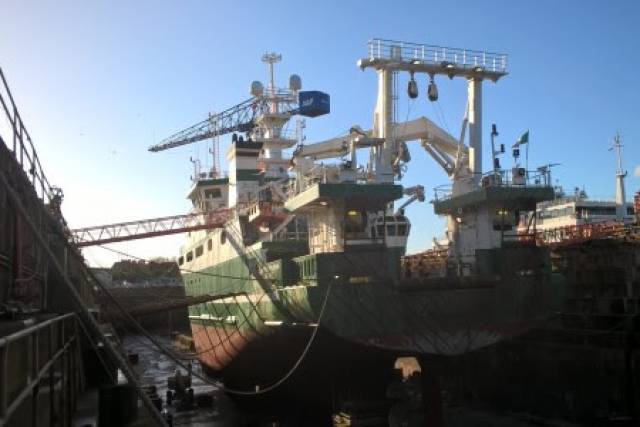#MarineScience - Research vessel RV Celtic Explorer of the Marine Institute, is off to a renewed start in 2018, after undergoing a major refit.
The Romanian-Dutch built ship is ready to accommodate 18 scientific surveys throughout the year.
The five-year refit included an overhaul of the bow thruster and an upgrade of its DC propulsion system. The vessel's original fishing sonar was removed and a new Simrad SU92 fisheries sonar installed. The new sonar will have an increased range and resolution and a decreased noise level, which will be a huge advantage for the Marine Institute's fisheries research.
The vessel's accommodation also received an upgrade after 15 years of service with cabin floors refurbished and a new accommodation layout in the scientists cabins. The RV Celtic Explorer's refit also included painting and antifouling of the hull and complete painting of the superstructure as well as a major 60,000 hour overhaul of one of its main diesel generators .
The 65.5m vessel was in A&P yard in Falmouth, United Kingdom for the refit which started in mid in December 2017 and works were completed this month.
The RV Celtic Explorer came into service in 2003 and is designed for fisheries acoustic research, oceanographic, hydrographic and geological investigations as well as buoy/deep water mooring and ROV Operations.
Several deepwater ROV surveys will be undertaken in 2018, one led by Dr Louise Allcock from the National University of Ireland, Galway will investigate deep sea corals and sponges from a diversity of deep-water habitats.
Professor Andrew Wheeler from the University College Cork will explore and monitor cold water corals in the submarine canyons in the deep ocean and determine their sensitivity to climate change, fisheries and oil industry impacts.
A survey led by Professor Sergei Lebedev from the Dublin Institute for Advanced Studies will investigate the structure, evolution and seismic hazard of Ireland's offshore territory. Professor Lebedev's team will for the first time, deploy an array of ocean-bottom, broadband seismometers offshore, which together with existing arrays onshore will cover the entire Irish territory.
Dr Aggeliki Georgiopoulou from the University College Dublin will survey the structure and composition of the lower crust and mantle, as well as any hydrothermal activity RV Celtic Explorer off to a renewed start in 2018 at the Charlie Gibbs Fracture Zone, the largest geological fault in the northern Mid-Atlantic Range.
In 2018 the Marine Institute will also undertake acoustic surveys of Anglerfish and Megrim, Blue Whiting, Celtic Sea Herring and Boarfish on the RV Celtic Explorer. An INFOMAR-led survey will also map the physical features of the seabed in the Celtic Sea, using hydrographic techniques.
To follow the voyages of the RV Celtic Explorer, visit the Marine Institute website to track a vessel or view the vessel schedule. A virtual tour of the RV Celtic Explorer can also be accessed from the Marine Institute website at www.marine.ie
































































